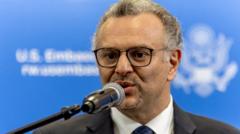Amid humanitarian concerns over aid reductions, U.S. Senior Advisor for Africa Massad Boulos emphasizes that President Trump values Africa, while discussing the need for transparency in U.S. aid programs.
Trump’s Africa Policy: A Paradox of Aid Cuts and Economic Interests

Trump’s Africa Policy: A Paradox of Aid Cuts and Economic Interests
U.S. Senior Advisor Massad Boulos asserts the importance of Africa to President Trump, despite significant aid cuts impacting millions.
Article Text:
Massad Boulos, the U.S. Senior Advisor for Africa, has stated that President Donald Trump views Africa as a critical region, despite recent aid cuts that have sparked humanitarian challenges. Upon taking office in January, Trump implemented significant aid reductions aligned with his "America First" approach. These cuts have raised alarms about their potential to jeopardize a key trade agreement designed to foster economic growth between the U.S. and African nations.
Boulos, in an interview with BBC Newsday, reassured that Trump “highly values Africa and African people,” countering speculations about potential closures of U.S. missions on the continent. These aid reductions have had dire consequences for health initiatives, particularly affecting shipments of essential supplies, including HIV medications. The World Health Organization warns that the halting of aid could result in a shortage of HIV drugs in several African countries, with Nigeria, Kenya, and Lesotho identified among those at risk.
The Institute for Security Studies estimates that millions of Africans could fall into extreme poverty next year due to these cuts. Tragically, the charity Save the Children reported multiple fatalities in South Sudan directly tied to the closure of health facilities due to reduced U.S. aid. However, Boulos disputed any direct correlation between these fatalities and the U.S. aid cuts, insisting these measures aim to ensure efficient fund allocation and accountability.
Boulos, who is also linked to Trump personally through family, mentioned growing American interest in mineral exploration in regions like the Democratic Republic of Congo, which is rich in resources essential for technology and electric vehicles. He expressed hope that U.S. investment could stabilize the violence that has plagued the eastern area of the country, while expressing concerns about Rwandan military operations there.
In defending U.S. motives in Africa, Boulos stated that the primary goal is to reinforce U.S. interests while establishing strategic partnerships, dismissing notions that the U.S. neglects Africa's welfare. He underscored Trump’s aim to end global conflicts, spotlighting the ongoing situation in Sudan.
Having recently visited Kenya, Rwanda, and Uganda, Boulos maintains business interests in Africa and is driven by a desire to rectify perceived inequities faced by the continent under previous administrations. Reports suggesting a significant reduction in U.S. diplomatic missions in Africa have been challenged by Boulos, insisting that the relationship remains vital for the Trump administration.
On the topic of trade tariffs, Boulos characterized their impact on most African nations as minimal due to low trade volumes, indicating that ongoing negotiations are geared toward fair outcomes. Countries like Lesotho, adversely affected by a 50% tariff, rely heavily on exports to the U.S. under the African Growth and Opportunity Act, a program introduced to stimulate trade with Africa, but its future remains uncertain under the current administration.
Massad Boulos, the U.S. Senior Advisor for Africa, has stated that President Donald Trump views Africa as a critical region, despite recent aid cuts that have sparked humanitarian challenges. Upon taking office in January, Trump implemented significant aid reductions aligned with his "America First" approach. These cuts have raised alarms about their potential to jeopardize a key trade agreement designed to foster economic growth between the U.S. and African nations.
Boulos, in an interview with BBC Newsday, reassured that Trump “highly values Africa and African people,” countering speculations about potential closures of U.S. missions on the continent. These aid reductions have had dire consequences for health initiatives, particularly affecting shipments of essential supplies, including HIV medications. The World Health Organization warns that the halting of aid could result in a shortage of HIV drugs in several African countries, with Nigeria, Kenya, and Lesotho identified among those at risk.
The Institute for Security Studies estimates that millions of Africans could fall into extreme poverty next year due to these cuts. Tragically, the charity Save the Children reported multiple fatalities in South Sudan directly tied to the closure of health facilities due to reduced U.S. aid. However, Boulos disputed any direct correlation between these fatalities and the U.S. aid cuts, insisting these measures aim to ensure efficient fund allocation and accountability.
Boulos, who is also linked to Trump personally through family, mentioned growing American interest in mineral exploration in regions like the Democratic Republic of Congo, which is rich in resources essential for technology and electric vehicles. He expressed hope that U.S. investment could stabilize the violence that has plagued the eastern area of the country, while expressing concerns about Rwandan military operations there.
In defending U.S. motives in Africa, Boulos stated that the primary goal is to reinforce U.S. interests while establishing strategic partnerships, dismissing notions that the U.S. neglects Africa's welfare. He underscored Trump’s aim to end global conflicts, spotlighting the ongoing situation in Sudan.
Having recently visited Kenya, Rwanda, and Uganda, Boulos maintains business interests in Africa and is driven by a desire to rectify perceived inequities faced by the continent under previous administrations. Reports suggesting a significant reduction in U.S. diplomatic missions in Africa have been challenged by Boulos, insisting that the relationship remains vital for the Trump administration.
On the topic of trade tariffs, Boulos characterized their impact on most African nations as minimal due to low trade volumes, indicating that ongoing negotiations are geared toward fair outcomes. Countries like Lesotho, adversely affected by a 50% tariff, rely heavily on exports to the U.S. under the African Growth and Opportunity Act, a program introduced to stimulate trade with Africa, but its future remains uncertain under the current administration.





















